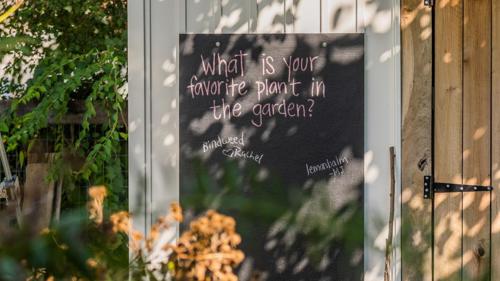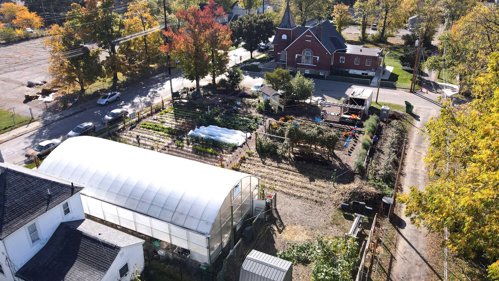Community gardens are places to cultivate and connect, where neighbors build relationships, revitalize vacant land, and provide one another with fresh food, nutrition, and physical and emotional sustenance. Led by positive change-makers in our community, organizers for urban gardens seek to harness food as an economic engine for opportunity by giving gardeners an active role in building a thriving, healthy community.
"Community gardens provide more than just access to fresh food—they are part of a larger urban agriculture food system that promotes public health, economic development, and social and racial justice through food sovereignty."
Karima Samadi, City of Columbus Policy Analyst
While community gardens have many proven positive impacts on neighborhoods, the space and the costs associated with creating and maintaining them can be significant barriers.

Franklinton Farms
In 2011, the City of Columbus, The Scotts Miracle-Gro Foundation, and Franklin County—longtime supporters of local community gardens—amplified their collective impact by collaborating on the Garden Grant program housed at The Columbus Foundation to support the operating and program costs of community gardens in central Ohio.
From community knowledge and funding to the distribution of gardening supplies, each partner brings its own expertise and resources to the Garden Grant program to amplify its impact in central Ohio's neighborhoods.
"The city, county, and corporate partnership exemplify what community collaboration could and should look like," says Karima Samadi, City of Columbus Policy Analyst. "As the name implies, it takes a ‘community’ to get gardens up and running, and their success lies in the strength of those partnerships. In addition to the breadth of resources and experiences the funders bring, we also engage with each other on other intersecting programs and projects that relate to the greater sociocultural, environmental, and economic ecosystem of public health."
Brian Herrington, Vice President External Affairs at The Scotts Miracle-Gro Company and the new President of The Scotts Miracle-Gro Foundation, says that the unique partnership is fueled by a shared mission and commitment to the community.
"All of the partners are working together toward common goals: to increase healthy, affordable, and local food access and education, particularly for people in under-resourced neighborhoods, and to connect individuals to the life-enhancing benefits of community gardens and greenspaces," explained Herrington.

Highland Youth Garden
Over the past few years, this partnership has helped to support more than 100 gardens, which builds upon years, and thousands of dollars, invested by each funder. As central Ohio continues to recognize the widespread and long-term benefits of community gardens, Samadi says that “many of these gardens have the desire to ‘scale up’ and further feed their community and create a more resilient local food system that can stand up to inflation and food supply chain setbacks that we experienced at the beginning of the COVID-19 pandemic.”
According to Herrington, community gardens, along with the people who lead them, serve as a beacon of hope and possibility, especially in underserved communities.
“We’ve seen firsthand how gardens and connecting with nature can transform lives,” says Herrington. “ScottsMiracle-Gro is well suited to support the development of community gardens and greenspaces. Even more so, we feel we have a social responsibility to do so.”
There's still time for nonprofit organizations to apply for next year’s round of Garden Grants. Visit the Nonprofit Center to learn more. Applications close by October 31.
